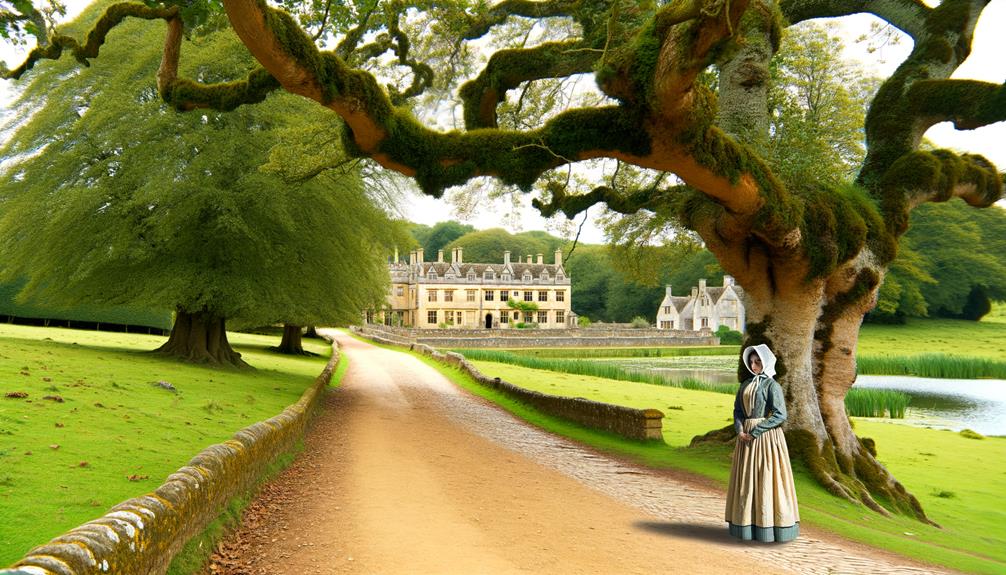Meaning of the Name Reeves
The name Reeves, derived from the Old English term 'gerefa', historically denotes local officials or stewards responsible for managing estates, collecting taxes, and maintaining law and order. This occupational surname evolved from 'gerefa' to 'reve' in Middle English, reflecting its significant role within the feudal system.
Primarily found in the UK and the United States, its variations include Reve, Reeve, and Reaves, shaped by linguistic changes and migration. Notable individuals like actor Keanu Reeves and singer Martha Reeves have brought cultural prominence to the name.
Exploring further will uncover more about its rich historical and cultural legacy.

Key Takeaways
- The name Reeves is derived from the Old English term 'gerefa,' meaning a local official or steward.
- It historically referred to individuals responsible for managing estates and enforcing local laws.
- The name evolved through Middle English as 'reve,' reflecting a pivotal feudal role.
- Variations like Reve, Reeve, and Reaves emerged due to linguistic changes and regional dialects.
- The Reeves surname has notable cultural impact through figures like actor Keanu Reeves and musician Martha Reeves.
Etymology of Reeves
Derived from Old English, the name Reeves originates from the term 'gerefa,' which historically referred to a local official or steward responsible for the administration of a district or estate. This term evolved through Middle English into 'reve,' denoting positions of local governance and management. The role of a 'gerefa' was significant in Anglo-Saxon society, serving as a precursor to modern administrative titles.
The etymology reflects the responsibilities and authority vested in these officials, who were pivotal in maintaining order and implementing local laws. As surnames began to formalize, 'Reeves' emerged to signify individuals who either held such positions or were directly associated with them, encapsulating a legacy of governance and civic duty.
Historical Context
The name Reeves finds its origins in medieval England, where it was derived from the Old English term ‘gerefa,’ meaning a steward or bailiff. Historically, the title was conferred upon individuals responsible for overseeing the administration of a lord’s estate. Over time, the surname Reeves became a hereditary family name, passed down through generations. The popularity of the name spread throughout England and eventually made its way to other English-speaking countries. The origin of the name Stevens, on the other hand, can be traced back to the medieval period as well, derived from the Greek name Stephanos, meaning “crown” or “garland”. Like Reeves, the name Stevens also became a hereditary surname and has a rich history in England and beyond.
Over the centuries, the name has evolved, reflecting shifts in societal structures and roles within the community.
Origins in Medieval Times
During the medieval period, the name Reeves emerged as a surname denoting a specific occupational role within the feudal system. Derived from the Old English word 'gerefa,' the term referred to a local official responsible for overseeing the administration of a district or manor.
This role was pivotal in maintaining order and managing agricultural duties, judicial matters, and local finance. The reeve held a position of significant authority, acting as an intermediary between the lord of the manor and the serfs or tenants.
As the feudal system structured society rigidly, the surname Reeves became associated with those entrusted with these essential administrative functions, reflecting a deep connection to the governance and organization of medieval communities.
Evolution Through Centuries
As the medieval period waned and societal structures evolved, the role and significance of the reeve transformed, reflecting broader shifts in governance and social organization across centuries. Initially a key manorial official, the reeve's responsibilities diminished with the decline of feudalism and the rise of centralized state power. By the early modern period, the reeve's administrative functions were largely absorbed by emerging local government entities.
| Century | Role of the Reeve |
|---|---|
| 11th – 13th | Manorial administrator |
| 14th – 16th | Decline in influence |
| 17th – 19th | Role absorbed by local gov. |
This evolution mirrors broader societal changes, as localized feudal governance gave way to more centralized and bureaucratic state structures. Understanding this historical context elucidates the reeve's shifting significance over time.
Occupational Significance
The surname 'Reeves' historically referred to a local official or steward, known as a reeve, who was responsible for overseeing the day-to-day operations of a manor or village in medieval England. This role, pivotal in agricultural and administrative management, illustrates the occupational roots of the name.
In modern times, while the specific job title of reeve may have faded, the legacy of administrative and managerial responsibilities continues to be relevant in various professional contexts.
Historical Job Roles
Historically, the name Reeves is derived from the Middle English word 'reeve,' which referred to a local official responsible for overseeing the administration and justice within a specific area, such as a manor or a shire. The reeve held significant responsibilities, including:
- Collecting taxes and rents: The reeve was tasked with ensuring that landlords received their dues, which were crucial for maintaining the estate.
- Supervising agricultural work: Overseeing the cultivation of land and managing laborers to guarantee productive farming.
- Maintaining law and order: Enforcing local laws and resolving disputes within the community.
- Reporting to higher authorities: Communicating with regional lords or the king's representatives to relay local matters of importance.
These roles illustrate the reeve's integral position in medieval governance and rural management.
Modern Day Relevance
In contemporary times, the name Reeves carries a legacy that can be seen in various professional roles emphasizing leadership, management, and administrative expertise.
Historically, Reeves were local officials responsible for overseeing the administration of laws and maintaining order within a community. This historical role has evolved, with modern-day individuals named Reeves often found in positions such as corporate executives, public administrators, and legal professionals.
Their duties echo the organizational and managerial tasks of their predecessors, requiring a keen understanding of governance, strategic decision-making, and effective communication.
The enduring significance of the name Reeves in contemporary professional settings underscores a continuing tradition of leadership and responsibility, seamlessly bridging past and present occupational contexts.
Geographic Distribution
Reeves, a surname with deep historical roots, is mainly found in the United Kingdom and the United States, reflecting patterns of migration and settlement over several centuries.
The geographic distribution of the name highlights its historical journey:
United Kingdom: Originating here, particularly in England, Reeves has been documented since the Middle Ages.
United States: The name crossed the Atlantic with early settlers, becoming widespread by the 19th century.
Australia: British colonization in the 18th and 19th centuries led to the name's presence here.
Canada: Migration during the 18th and 19th centuries saw the name establish in various provinces.
This distribution underscores the socio-historical movements that have shaped the presence of the Reeves surname globally.
Variations and Derivatives
While the surname Reeves has maintained its original form across many regions, various historical records reveal numerous variations and derivatives that have emerged over time. These variations often resulted from linguistic evolution, regional dialects, and transcription errors during record-keeping. Common derivatives include 'Reve,' 'Reeve,' and 'Reaves,' each reflecting slight phonetic and orthographic differences but ultimately pointing back to the same occupational root. The table below illustrates some notable variations:
| Variation | Origin/Explanation |
|---|---|
| Reve | Simplified spelling, often seen in early records |
| Reeve | Singular form, common in medieval documents |
| Reaves | Phonetic variant, prevalent in certain regions |
These adaptations provide a fascinating glimpse into the surname's historical journey and linguistic flexibility.
Famous People Named Reeves
Among the many individuals who have carried the surname Reeves, several have achieved prominence in various fields, contributing greatly to culture, science, and public life.
Notable figures include:
- Keanu Reeves: An acclaimed actor known for his roles in 'The Matrix' and 'John Wick' series, whose influence extends beyond cinema into philanthropy.
- Reeves Gabrels: A distinguished guitarist and songwriter, best recognized for his collaboration with David Bowie and work with the band The Cure.
- Jim Reeves: A legendary country music singer whose smooth voice and timeless hits like 'He'll Have to Go' left an indelible mark on the genre.
- Martha Reeves: The lead singer of the Motown group Martha and the Vandellas, celebrated for classics like 'Dancing in the Street.'
Cultural Impact
The surname Reeves has left a significant cultural imprint, evidenced by the diverse contributions of its bearers across various domains such as entertainment, music, and public life.
In the domain of entertainment, actors like Keanu Reeves have achieved global recognition, influencing film and popular culture with works such as 'The Matrix' series.
In music, Martha Reeves of Martha and the Vandellas has shaped the soundscape of Motown, leaving an indelible mark on American music history.
Public life too has seen notable figures, such as Jim Reeves, whose popular country music and philanthropic efforts have resonated deeply with audiences.
These individuals have collectively enriched their respective fields, underscoring the enduring cultural significance of the Reeves name.
Conclusion
The name Reeves encapsulates a rich tapestry of history and etymology, juxtaposing its origins as an occupational surname with its widespread geographic distribution. From its roots in medieval England, where a reeve was a respected local official, to its contemporary cultural impact and notable bearers, Reeves illustrates a journey from the mundane to the extraordinary.
Variations and derivatives further highlight its linguistic adaptability, cementing Reeves as a name of significant historical and cultural resonance.






